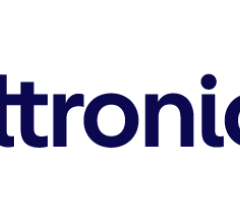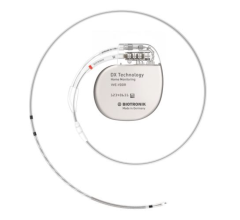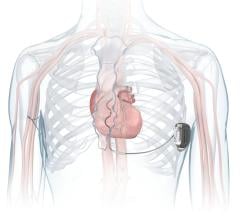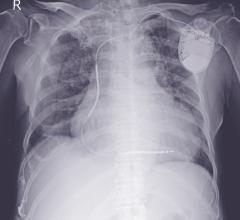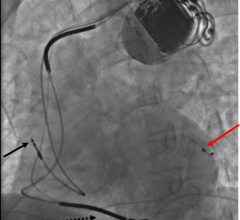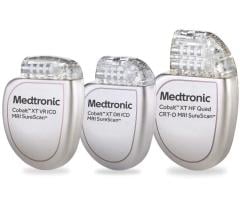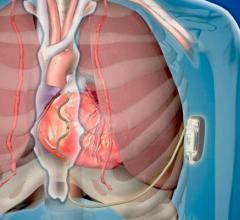September 30, 2008 - New research shows cardiac resynchronization therapy (CRT) reduced the time to first heart failure hospitalization or death by nearly half in patients with mild heart failure, and devices equipped with OptiVol Fluid Status Monitoring identified patients who were at a significantly higher risk (3.5 times) of having a heart failure event in the near future.
The findings from the REVERSE (Resynchronization Reverses Remodeling in Systolic Left Ventricular Dysfunction) and PARTNERS HF (Multi-site Program to Access and Review Trending Information and Evaluate Correlation to Symptoms in Patients with Heart Failure) trials, both sponsored by Medtronic Inc., were presented last week as late breaking clinical trials during the 12th Annual Scientific Meeting of the Heart Failure Society of America (HFSA) in Toronto. The studies demonstrate the value of CRT and device diagnostics in managing heart failure patients and their hospitalizations.
European patient data shows CRT, in combination with optimal medical therapy (OMT), significantly reduced the risk of heart failure hospitalizations or death in the first 18 months over OMT alone in patients with asymptomatic or mild heart failure. Currently, CRT is indicated for patients with moderate or severe heart failure. Optimal medical therapy is considered to be beta blockers and ACE inhibitors or aldosterone-receptor blockers. At 18 months, 15.7 percent of study patients without CRT were hospitalized for heart failure or died versus 7.5 percent of heart failure patients studied with CRT; approximately a 50 percent reduction. Additionally, CRT is shown to help improve the heart’s pumping efficiency and reduce its size.
Presented by William T. Abraham, M.D., FACC, chief of cardiovascular medicine at Ohio State University, with 610 patients studied, REVERSE is the first large-scale, global, randomized, double-blind trial to demonstrate the benefits of CRT in mild heart failure patients or asymptomatic patients who previously had heart failure symptoms.
“Even in patients who generally have mild or no symptoms of heart failure, CRT can have a positive impact and delay the time to first heart failure hospitalization or death,” said Dr. Abraham. “Preventing the progression of heart failure with device therapy can lead to better patient outcomes and reduce economic burden to the hospital and health care system.”
Twelve-month REVERSE data has been presented at a number of scientific congresses in Europe and the United States. These results represent findings at 18-months for the European blinded cohort, which will be followed for 24 months. Despite the trial not meeting statistical significance for its primary endpoint (percent of patients worsened at 12 months using a heart failure clinical composite score, which includes subjective and objective measures of heart failure status), more patients in the trial improved with CRT; this trend continues at 18 months.
PARTNERS HF data demonstrated that monitoring fluid trends in the chest cavity using Medtronic’s OptiVol identified patients more likely to have subsequent heart failure events, such as shortness of breath, fatigue, tissue swelling due to fluid build up, and decompensation or deterioration of the heart. Patients with a fluid index crossing above a threshold of 100 ohm days during the 21 days prior to their six month visit were two times more likely to have a heart failure event in the following six months independent of other clinical variables. Another analysis that simulated more frequent monitoring demonstrated patients with a fluid index crossing were about 3.5 times more likely to have subsequent heart failure events independent of other clinical variables.
“These findings demonstrate that continuous device monitoring of heart failure patients in addition to periodic office visits can identify patients at increased risk for future heart failure events,” said David Whellan, M.D. MHS, associate professor of medicine at Thomas Jefferson University Hospital in Philadelphia. “Ongoing fluid monitoring can help me better manage my heart failure patients and intervene earlier before symptoms worsen.”
Dr. Whellan presented the initial findings from this 12-month prospective, multi-center, observational, unblinded study, which includes 707 CRT with defibrillation (CRT-D) patients.
OptiVol Fluid Status Monitoring is found only on Medtronic cardiac resynchronisation therapy-defibrillators (CRT-Ds) and implantable cardioverter-defibrillators (ICDs). It uses low electrical pulses that travel across the thoracic cavity (the chest area encompassing the lungs and heart) to measure the level of resistance, indicating fluid in the chest – a common sign of heart failure. Since normal fluid levels vary from patient to patient, and fluid accumulation can be either slow or rapid, OptiVol’s ability to measure fluid status trends over time can provide important insights that are used in conjunction with ongoing monitoring of other patient signs and symptoms, the company said.
For more information: www.medtronic.com


 January 13, 2026
January 13, 2026 

